For Black History Month, CSE Spotlights Faculty and Alumni in Academia

 Enlarge
Enlarge
Marcus Darden
Marcus Darden (MSE ME ’94) is a Lecturer in CSE with over 15 years of teaching in the field. He currently teaches computer science classes in large, multi-section courses (600+ students) and serves as a faculty advisor for computer science major and minors, helping students to make course, elective, and career decisions.
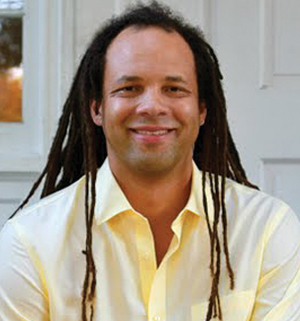
 Enlarge
Enlarge
Darden joined the faculty at CSE in 2014 and has primarily taught EECS 281, Data Structures and Algorithms, and EECS 398, Computing for Computer Scientists. In 2016, he was named the 2015-2016 HKN Professor of the Year in CSE by the Beta-Epsilon chapter of Eta Kappa Nu (HKN), the national honor society for electrical and computer engineers.
Darden is active in the department’s outreach efforts and serves as course designer and chief instructor for CSE’s MiBytes@ the MEZ summer camp for high school students in Detroit. He also designs and leads one of three summer programs offered for high school students in CSE’s Ann Arbor based MiBytes camp.
“Learning about computer science is so important,” says Darden, “because our whole world is going toward computing.” Regarding the importance of the MiBytes program, he notes that “it’s taken students who thought they couldn’t program and turned them into app developers. The program also gives students a new appreciation for what computer science is and its importance in out lives.”
Darden came to the Department from Olivet College, where he served as the Chair of the Department of Mathematics and Computer Science from 2002-2009 and as the Computer Science Program Director from 2009-2014. While at Olivet, he also taught coursework from 100- to 400-level courses for computer science majors and minors.
Prior to Olivet, he worked as a software engineer in industry. Darden continues to consult with Toronto-based software firm NS Basic, which builds software development tools for mobile devices, since 1997. His work there has been a mix of documentation, software design and construction, marketing, and product support.
Outside of CSE, Darden plays tenor sax in the Lansing-based band Global Village.
Darden received his BS in Mechanical Engineering from the Massachusetts Institute of Technology 1992. He received an MSE in Mechanical Engineering at the University of Michigan in 1994 while also completing MS coursework in CSE.
Odest Chadwicke Jenkins
Odest Chadwicke Jenkins is an Associate Professor at CSE, where he leads the Laboratory for Progress (Perception, Robotics, and Grounded Reasoning Systems). His research aims to discover methods for computational reasoning and perception that will enable robots to effectively assist people in common human environments.
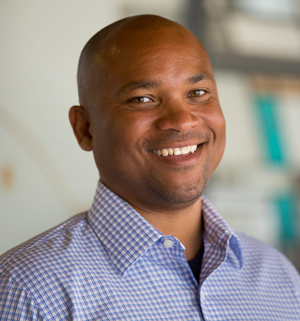
 Enlarge
Enlarge
Prof. Jenkins’ active projects include perceptual reasoning for goal-directed robotic manipulation, interactive systems for assisted robot teleoperation, and independent living technologies for aging populations.
His past projects include robotic person following and gesture recognition, robot learning from demonstration, physics-based tracking of human motion from video, protocols and libraries for web/cloud robotics, markerless model and motion capture, inertial motion capture, balance control of simulated humanoids, and humanoid imitation learning.
In 2013, Prof. Jenkins presented at the National Geographic Explorers Symposium about his work in robotics, where he stated that the impact of robotics is in an early stage and predicted that its growth and pervasiveness would mirror the impact of the computer. He envisioned a World Wide Web of Robotics in which users would be able to leverage web-based apps that would allow them to control robots through customized interfaces to accomplish remote or otherwise challenging tasks.
In one example, he spotlighted his work with Henry Evans, an individual who had become a quadriplegic in 2002. Prof. Jenkins’ team developed an interface based upon Mr. Evan’s physical constraints that enabled him to use a custom web interface to pilot a quadrotor drone in order to navigate and view spaces beyond his reach.
In a paper presented at the 2015 IEEE Conference on Intelligent Robots and Systems, Prof. Jenkins and his collaborators made contributions toward the long-standing challenge in robotics of executing manipulation tasks involving sequential pick-and-place actions in human environments. Central to this problem is the inability for robots to perceive in cluttered environments where objects are physically touching, stacked, or occluded from view, which prevents robots from distinguishing individual objects and impairs their ability to execute desired pick-and place-actions. In the paper, the researchers introduce the Axiomatic Particle Filter as a method for simultaneously perceiving objects in clutter and performing sequential reasoning for manipulation.
Prof. Jenkins has a strong belief in the importance of shared knowledge to facilitate progress. He has stated that, “Our job is to build things, to build knowledge, to create ideas – even crazy ideas – and put them out there so that others can develop the next generation technology, the next generation set of ideas.”
Prof. Jenkins’ interest in robots and computer science has roots in an early love of video games. When he was a child, his parents bought him an Atari 2600 game system; he loved it and soon began dreaming about how he might create his own games. Learning to program video games and to think about the creation of virtual worlds led to an interest in coding for the real world – and robots, as systems in the real world.
Prof. Jenkins’ research has been published in numerous scholarly and professional journals, including Human-Robot Interaction and Computer Vision and Pattern Recognition. In 2010, he co-authored the book Creating Games: Mechanics, Content, and Technology. He has served on the editorial board for International Journal of Robotics Research, and the International Journal of Humanoid Robotics.
Prof. Jenkins received his PhD in Computer Science at the University of Southern California in 2003. He served on the faculty of Brown University in Computer Science from 2004–2015 and joined the faculty at Michigan in 2015.
Prof. Jenkins has been recognized as a Sloan Research Fellow in 2009 and as one of Popular Science’s “Brilliant 10” in 2011. He is a recipient of the Presidential Early Career Award for Scientists and Engineers (PECASE) for his work in physics-based human tracking from video. His work has also been supported by Young Investigator awards from the Office of Naval Research (ONR) for his research in learning dynamical primitives from human motion, the Air Force Office of Scientific Research (AFOSR) for his work in manifold learning and multi-robot coordination, and the National Science Foundation (NSF) for robot learning from multivalued human demonstrations.
Jason Mars
Jason Mars is an Assistant Professor at CSE, where his research interests include cross-layer systems architectures in both software and hardware, data center and warehouse scale computer architecture, and hardware/software co-design focused on native application performance, energy efficiency, and system utilization, particularly in the context of the latest innovations in microarchitectural design, runtime systems, and cloud computing.
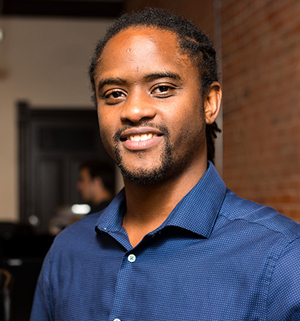
 Enlarge
Enlarge
Prof. Mars’ work is noteworthy because it takes the path of cutting across many of the traditional areas of specialization in computer science, such as system architecture, artificial intelligence, or operating systems and compilers, amongst others. Prof. Mars looks at how these realms interact in the overall context of creating intelligent and efficient cloud computing platforms that will be responsive to users’ needs.
“We have to discover ways to re-think the system architecture of data centers to be able to provide the necessary computing efficiently enough to service the millions and potentially billions of users who are interacting with cloud services in increasingly sophisticated ways,” says Prof. Mars.
This will require, he says, a new layer of abstraction that lives between the applications that run on cloud systems and the underlaying hardware. Since joining CSE in 2013, he and his collaborators have launched a number of projects in this area, one of which has grown into a commercial venture.
In 2014, Prof. Mars and his collaborators announced Protean Code, a new technique for recompiling the applications that run on data center servers and introducing that updated code as needed. Protean Code allows data centers to dynamically rebalance the use of system resources as needs dictate, and it is unique in doing so without a performance penalty during recompilation.
In 2015, after recognizing that unique processing requirements existed for processing media-intensive user interactions, Mars and others introduced an open-source intelligent personal assistant (IPA) platformthat included speech recognition, image matching, natural language processing, and a Q&A system.
Because commercially available IPAs, such as Apple’s Siri and Microsoft’s Cortana, were essentially “black boxes” that could not be manipulated, the Michigan researchers’ IPA system was intended to be used primarily by those who needed to understand the inner workings of such systems and how they would interact with data center resources.
Prof. Mars and others also recognized that cloud-based IPA systems represented an enabling technology in the next generation of smart applications, and as a result, Prof. Mars engaged in two additional notable projects.
One is a partnership between Michigan and IBM, led by Prof. Satinder Singh Baveja, aimed at creating an advanced conversational computing system. Announced in early 2016 with $4.5 million in funding from IBM, the project is envisioned to create a system that will engage in natural, multi-turn conversations with users, similar to human-to-human conversations. It will ultimately be deployed as a “digital advisor” for computer science students, advising on routine matters and handing off conversations to human advisors for more specific and personalized counselling.
In another ongoing project, Prof. Mars, along with his key collaborator Prof. Lingjia Tang and some of their current and former students, commercialized their IPA technology through the startup Clinc in the latter half of 2015. In addition to working with partners who will use their technology, Clinc has introduced Finie, an intelligent personal financial assistant that helps users to talk to their bank accounts in a natural and conversational way to get real-time and instant financial insights.
Prof. Mars received his PhD in Computer Science at The University of Virginia in 2012 and joined the faculty at Michigan in 2013. From 2012–2013, he was the Peggy and Peter Preuss Faculty Scholar in the CSE department at the University of California, San Diego. He has served as a visiting scientist at Google, which involved investigating opportunities to improve efficiency of Google’s backend infrastructure.
Prof. Mars work has been spotlighted as an IEEE Micro “Top Pick” in 2011, 2012, and in 2016. He received an NSF CAREER Award in 2016. He served as Program Chair for the 2015 International Symposium on Code Generation and Optimization (CGO).
Kyla McMullen
Kyla McMullen (MSE CSE ’07, PhD CSE ’12) is currently an Assistant Professor at the University of Florida in the Department of Computer and Information Science and Engineering. Her primary research interests lie in rendering 3D audio to enhance virtual environments and to sonify information sources.
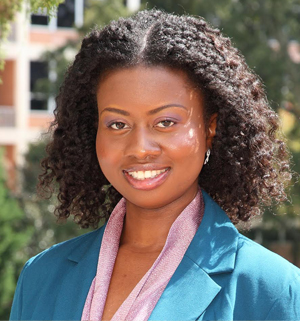
 Enlarge
Enlarge
Prof. McMullen, the first African-American woman at the University of Michigan to graduate with a PhD in Computer Science and Engineering, was fascinated by computers and technology at an early age. She attributes her desire to learn computer science to her high school teacher, Mr. Randy Ware, who worked to break his students’ stereotypical view of what a computer scientist looked like. This realization pushed her to continue her education in computer science after graduating high school.
McMullen decided to attend the University of Maryland for her undergraduate studies, and while there, she applied and won a scholarship through the Meyerhoff Scholars Program. The scholars program strives to increase diversity in science, technology, engineering and related fields, and provides community support and mentors to help students succeed.
After completing her bachelor’s, McMullen made her way to U-M where she continued her graduate studies in computer science and engineering. In 2007, while working on her Master’s, McMullen began constructing educational software that taught children how to identify relationships between objects. She also worked on a research project through the Naval Submarine Medical Research Lab involving the construction of virtual environments that are navigable primarily using virtually spatialized sound cues; that work has potential applications for assistive technologies, training simulations, workers in sight-restricted environments.
Under the guidance of her advisor, Prof. Greg Wakefield, McMullen completed her doctoral research, which focused on assessing the individualization of rendering virtual sounds over headphones. While earning her Ph.D. she also worked as a lecturer at Wayne State University teaching computer literacy courses to over 2,000 students.
At the University of Florida, McMullen’s research focuses on virtual environments, assistive technology, data sonification, and education.
Outside of teaching, McMullen strives to increase the number of underrepresented minorities in STEM fields. She is involved in a number of organizations, including the National Society of Blacks in Computing, and makes public appearance to increase the number of underrepresented minorities in computer science.
James Mickens
James Mickens (PhD CSE ’08) is currently an Associate Professor of Computer Science at Harvard University. His research focuses on the security and performance of large-scale web services.
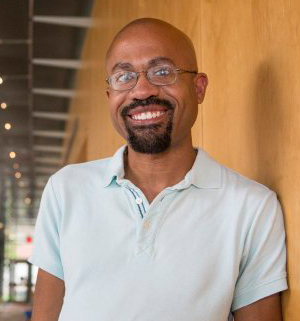
 Enlarge
Enlarge
While growing up in Atlanta, Mickens recognized the importance of making connections with a diverse set of people. As one of the only black kids in his private school, he had to learn how to engage and connect with different people, and he realized that it is possible to make connections with almost anyone. As a professor, Mickens enjoys mentoring students from all backgrounds, and helping them to improve both their technical skills, and the “soft” skills which are needed to make effective presentations and succeed in interviews.
Mickens received his B.A in Computer Science from The Georgia Institute of Technology in 2001 and went on to U-M to receive his PhD in CSE. He completed his dissertation entitled, “Exploiting Host Availability in Distributed Systems,” under the guidance of Prof. Brian Noble. While at U-M, Mickens was notorious for scheduling his thesis defense in the early hours of the morning so that nobody would attend it. After graduate school, Mickens went to Microsoft Research in Redmond, WA, where he spent six years as a member of the Distributed Systems group. At MSR, he performed research, collaborated with product groups, and supervised interns who later became professors and developers at top universities and technology companies.
During the Fall 2014 semester, he was a Visiting Professor at MIT, working with the Parallel and Distributed Operating Systems group and in Fall 2015, he became an Associate Professor at Harvard.
One of his most recent research projects focused on increasing the speed of web pages by using fine-grained dependency tracking. Mickens and his collaborators created Polaris, which is a dynamic client-side scheduler that uses fine-grained dependency graphs to dynamically determine which objects to load, and when.
Outside of teaching, Mickens presents at a number of conferences, including his most recent one at NDC Sydney 2016, where he talked about his life as a developer. He also plays in two heavy metal bands and writes satirical blogs about technology.
For MLK day in 2015, Mickens participated in Reddit AMA (Ask Me Anything), where he discussed the underrepresentation of minorities in STEM fields. There, he was able to have an open discussion about some of the underlying issues that may have an impact of the number of minorities in computer science. He discussed the importance of being prepared and focused during class and interviews and having good mentors/role models, but he also pointed out that being well connected in the field can have a big affect on students’ career goals. He also made some suggestions on what to do inside the tech world to help solve the under-representation of minorities, including being aware of these biases and anonymizing the hiring process.
Kunle Olukotun
Kunle Olukotun (PhD CSE ’91) is the Cadence Design Systems Professor of Electrical Engineering and Computer Science at Stanford University. His current research projects focus on domain-specific languages (DSLs) and specialized architectures.
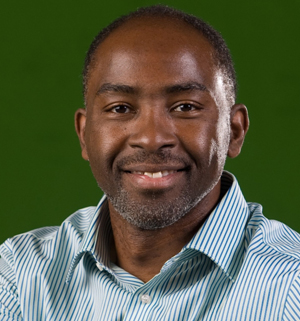
 Enlarge
Enlarge
Born in London, Olukotun was captivated by his math and science classes, ultimately leading him to pursue a career as a computer scientist – a stark difference from his father who was a lawyer and his mother who worked as a secretary. At the age of 12, his parents decided to permanently move back to their home country of Nigeria, where he continued to foster his knowledge of math, science, and technology. After completing secondary school, he convinced his parents that he should attend an American university to pursue his education in engineering.
Olukotun decided to attend Calvin College in Grand Rapids, MI, with the expectation of transferring to U-M after his junior year. At that time Calvin did not have a four-year engineering program. He joined the undergraduate electrical engineering program that was still on central campus in what is now East Hall. It was a great time to be at U-M with lots of innovative high-performance computing research being developed in the Advanced Computer Architecture Laboratory (ACAL). His desire to contribute to this exciting research led him to stay at U-M for graduate school. He completed his dissertation on high-speed Gallium Arsenide microprocessors under the guidance of his advisor Prof. Trevor Mudge, and earned his Ph.D. in Computer Science and Engineering.
Once he completed his Ph.D., Olukotun had a job lined up at Motorola in Austin TX, but an unplanned conversation with a Stanford professor, named Michael Flynn, influenced him to reconsider his future. It’s after this conversation in 1991 that he decided to apply for an assistant professor position in the EE department at Stanford University.
While at Stanford, Olukotun realized that microprocessors of that time wouldn’t efficiently scale up by making single processors more complex. To solve this problem, Olukotun and his students designed the first general-purpose multicore CPU, called Hydra. This processor was constructed by building four copies of a simpler CPU core on one chip instead a single complex CPU. The Hydra design, while much more scalable, forced programmers to face the difficult task of writing parallel programs with threads of instructions that must be executed together. The Hydra design was very controversial in the mid-nineties, when it was conceived, but now every cell-phone microprocessor uses this design approach.
Olukotun took his findings from Hydra and founded Afara Websystems, a company that designed and manufactured low power server systems with chip multiprocessor technology. He wanted to address the problem of data centers running out of power and space, and he believed it could be solved with multiple processors on a chip in conjunction with multi-threading. The Afara technology became known as Niagara. In 2002, Afara was acquired by Sun Microsystems, Inc., a company that manufactured computers, computer components, and software. Niagara became the center of Sun’s throughput -computing initiative and became the foundation for a line of popular computing systems. Sun was acquired by Oracle in 2010, and the Niagara line of processors is now in its ninth generation.
After returning to Stanford from Sun, Olukotun decided to tackle the problem of making it easier to develop parallel software for multicore processors. He became the director of the Stanford Pervasive Parallelism Lab (PPL), which seeks to make it easy to develop parallel programs in all application areas using Domain Specific Languages (DSLs). A big focus of his current research is on the problem of developing programming environments and specialized parallel hardware for big data analytics and machine learning. One of the goals of this research is to enable truly smart mobile devices. While at Stanford, Olukotun has advised over thirty PhD students, one of his well-known advisees is our own Prof. Valeria Bertacco. Olukotun is an ACM Fellow and an IEEE Fellow for his contributions to the field of computer architecture.
 MENU
MENU 
